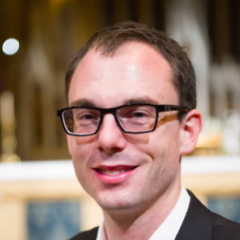I have always been skeptical of concert performances of operas. Operas are written to be acted, and the staging is needed to complement the music. This is what I thought before I saw this performance of Ashkenazy conducting the Sydney Symphony Orchestra, Sydney Philharmonia Choirs and Sydney Children’s Choir in Tchaikovsky’s The Queen of Spades. Tchaikovsky’s opera is so intensely lyrical and so well written that it stands the test of being heard alone without any staging. The musicians’ performance of it was so utterly compelling that I found myself engaged in the plot, including all the tensions and dramas of the narrative.
Tchaikovsky’s opera is based on a tale by Pushkin and as the evening’s program notes describe it, it is a “story of obsession”, in which the opera’s hero is a “damaged soul”. This initially rational young man, Herman, becomes increasingly unhealthily fixated on his love for a woman and the prospect of winning a fortune at a game of cards. The secret of the three cards he needs occupies his mind more and more, so much so that he becomes more concerned about this than about the object of his love, Lisa. Herman eventually learns what these three cards are. However, the opera ends in tragedy when the last of these cards is in fact the wrong one. Instead, it is the queen of spades. Having gambled his fortune on the three cards, Herman takes his own life.
The Sydney Symphony chose a stellar cast for this performance headed up by Australian tenor Stuart Skelton, playing the part of Herman. Skelton’s career has taken him to many of the top opera houses around the world, so it was a rare opportunity to hear him in his home city of Sydney, performing a role which he had never performed before. This role is one of the most demanding in the repertoire, such is the incessant amount of intensity and passion as well as the relentless number of high notes required. Skelton well and truly embraced this performance and was the stand-out singer of the evening. He sang with a great deal of colour as well as a seemingly never-ending supply of vocal power.
Skelton was by no means the only outstanding vocal performance of the evening. All four of the other principal male singers were impressive. There was also a strong cast of female singers. Particularly beautiful were the duets by Dina Kuznetsova (Lisa) and Deborah Humble (Pauline/Milovszor). Their duet at the beginning of the second scene of Act I was exceptional. The cast of soloists was very ably supported by the Sydney Philharmonia Choirs. All of their contributions were incisive and effective. Their singing was powerful when it needed to be, easily able to balance with the large orchestra on stage. At other times, their singing was very moving. There is something very magical about a large number of singers singing together quietly. Their off stage section at the beginning of Act III when Herman imagines the Countess’ funeral was very beautifully handled.
Ashkenazy held the whole performance together with great style. This music is in his blood and he reveled in it, clearly inspiring the musicians with his passion for the work. It is a work which is somehow deeply lyrical and charming, but also equally unsettling and full of uneasy tension at the same time. To bring out these contrasting aspects of the drama in a concert performance requires a special performance, and this one was delivered with great passion to a packed house.


